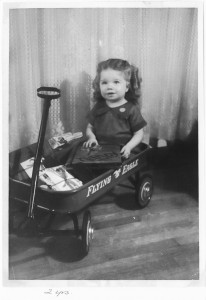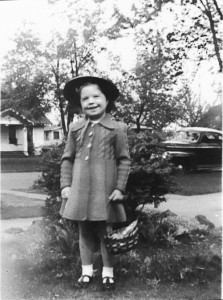“They soon realized that they were going to have to get two people to replace me.”
NANCY
I was born in 1938 and raised in the community of Yakima, Washington, so my early childhood was during World War II. My father worked in the petroleum industry and my mother was a homemaker. I would say that as a kid I was a pretty regular person. I think that I was very attentive to detail; I was caring and nurturing. I had a younger sister and I was her caretaker and playmate, so I think I learned lots of responsibility when I was very young.
I graduated from Yakima High School in 1957. In those years I don’t know that women were looking to be CEOs of companies as I see today. The business field was a means to an end; it was a job. Quite a few women would work after they had graduated from high school and/or college and then would stay home when they started raising a family. I don’t think women working in business were career oriented, thinking that that was what they were going to do for the rest of their lives. For women, teaching or nursing might be careers that would be with you for a longer period of time.
I moved from one job to another. I kind of got in the routine of getting one job under my belt, and then I would go to another job just for a little more challenge and for something a little bit different. I had gone to work for a company that was in the field of copying machines and at that time it was a very new industry so there was a learning curve there to know the types of copiers that we were working with. And not only was I taking care of financials and correspondence and knowing about the products, there was a retail side to the business. Customers were coming in and I needed to be able to demonstrate the copy machine and to be courteous and give them the time that they needed because they had a lot of questions about the machines.
My boss was a very personable person and he was very involved in the community, in Rotary activities and American Red Cross. So I kind of ended up doing his correspondence for his Red Cross work as well as for the business. He was a nice gentleman to work with—he wasn’t a difficult person—but with his outgoingness and wanting to be involved in so many things himself I don’t think he really thought about how it might be reflecting on his office personnel. The workload just kept getting bigger and bigger for what I had been hired for. With the retail aspect of the business and having to stop what I was doing in the office in order to take care of a customer’s needs, as well as, “Here’s a letter for Red Cross, and here’s three letters for Red Cross”—the work had just mushroomed. And then he also wanted his bills out on time, of course. So in order to make those things happen I had to find time in my schedule—not in the office hours schedule—and I started coming in early. I thought it was my area of responsibility. It just had to be done. I thought, “Whatever it takes for me to do this, then I will do that.” And then it just became top-heavy, overloaded.
During this time I started thinking, “Oh my goodness, my husband’s in education and those few people that we are friends with are educators. Maybe I should go back to school and get a degree in education.” So I started taking one night class a quarter at the community college. But as the workload increased on the job—I would have to go in so early in the morning to get my clerical and bookkeeping work done because of the interruptions with retail customers coming later—it just became too much. Finally, I decided one day—well, my husband decided for me and called the boss and said, “My wife has gone to work at 6:00 this morning to get her work done and I’m tired of that.”
So my boss came in that day and said, “Oh! I didn’t realize that! My wife’s going to come in and help out!” But that was kind of a stopgap measure because she wasn’t always available or she wasn’t taking on a full load of the responsibility. It had come to a point to where somebody else was going to have to come in and be a part of that office team to make things work, so I went to my boss and said, “I’m quitting this job and I’m going to go to school full time.” And that was exactly what I did.
I guess I felt that it was time for me to decide what I wanted to do and how I wanted to do it. It was a hard decision for me because it meant that I was giving up financial resources that my husband and I were laying aside for building a house. And more than the financial sacrifices, it meant that there were time commitments—not only would I be going to school during the daytime, but then there was a lot of study time and that perhaps our weekends wouldn’t be as free as we had known them to be. And I wouldn’t be as able to spend time with family and friends or in developing relationships. I think all of those things came into play in making that decision. It made it really hard. But we felt that this was a good sacrifice for a long-term goal.
My boss was actually very understanding. He didn’t criticize me; he didn’t act angrily toward me. He said, “Well, if that’s the decision you’ve made we’re going to have to make some changes around here.” And I said, “Yeah, that was the point.” I left on a reasonable time schedule. I didn’t leave him high and dry beyond quitting in two weeks. I arranged time for us to ease out and for somebody else to be hired that I could work with, but they soon realized that they were going to have to get two people to replace me. The job needed to be divided up. And I was willing to work with them and help. Somebody had to help make the transition.
♦





